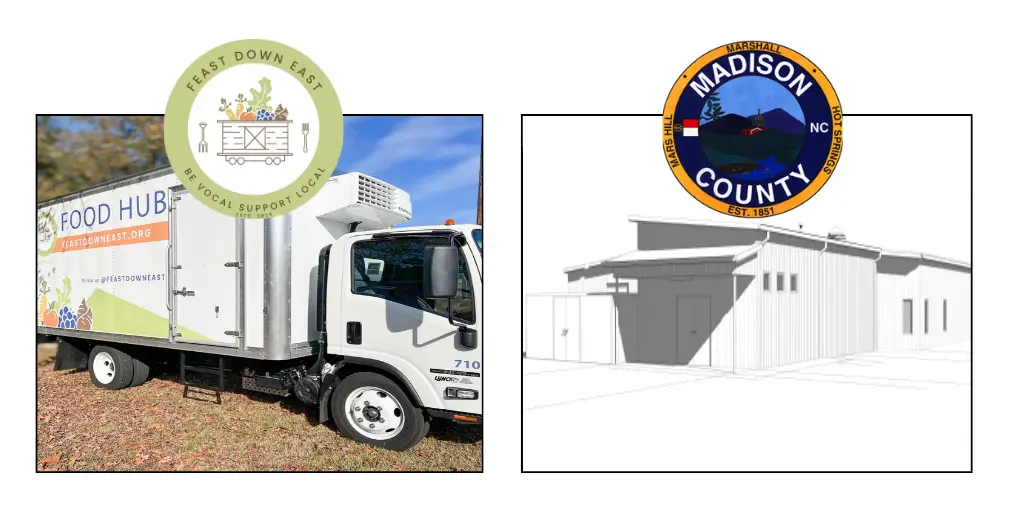Food hubs in both Eastern and Western North Carolina are working to grow their reach, support more farmers, and increase access to local food thanks in part to strategic funding from the Golden LEAF Foundation.
Across Southeastern North Carolina, Feast Down East is scaling its operations to meet rising demand from farmers and buyers. The Golden LEAF Foundation Board of Directors awarded Feast Down East $250,000 through the Open Grants Program to increase refrigeration and storage capacity at its Burgaw food hub and Wilmington satellite location.
The results have been clear: between 2022 and 2024, food hub sales grew from $421,756 to $468,667, the number of mobile markets expanded from 283 to 496, and the number of farmers served more than tripled from 17 to 57.
“Increasing our storage capacity has been a game-changer,” said Jordyn Appel-Hughes, Executive Director of Feast Down East. “It has allowed the Mobile Market to purchase and sell more products from local farmers, diversify our customer base through programs like CSA, and even created opportunities for farmers to rent space for storage crops or overflow items.”
The mobile markets are working towards doubling their previous outreach.
“Our mobile markets fill a critical gap in food access by providing families with reliable opportunities to purchase healthy, local, and affordable foods, while still having autonomy in their choices,” said Appel-Hughes. “At the same time, they create dependable sales channels that farmers can count on.”
Appel-Hughes added that Feast Down East’s success is rooted in relationships.
“Our momentum really comes down to our people,” said Appel-Hughes. “We have dedicated staff who go above and beyond to build meaningful connections with farmers, customers, and community partners. By consistently showing up with our programs and being transparent in our communications, we’ve built trust and lasting relationships that fuel growth.”
These relationships resulted in growing into new counties.
“Expanding into new counties has opened the door for farmers to reach more buyers and increase their sales,” said Appel-Huges. “It’s also provided greater access to technical assistance, helping farmers strengthen their infrastructure so they can broaden their reach even further.”
In Madison County, the Golden LEAF Board of Directors awarded $304,000 to upgrade and expand the Madison County Extension Value-Added Center and Inspected Kitchen. The facility has long served as a hub for farmers and food entrepreneurs, providing shared-use equipment, climate-controlled storage, and inspected kitchen space. With Golden LEAF funding, the expansion will give farmers new opportunities to diversify their products, enter new markets, and grow their businesses.
“Golden LEAF’s funding is the cornerstone of this project,” said Elizabeth Ayers, Director of Madison County Cooperative Extension. “It’s more than just a grant; it’s a strategic investment in the future of our local food economy. After the devastation from Hurricane Helene, we’ve seen an uptick in the demand for use of our current kitchen with new food entrepreneurs, and this new commercial kitchen will be a catalyst for growth, empowering our farmers to increase their profitability and providing the infrastructure needed to meet this increased demand and help a new wave of food entrepreneurs succeed right here in Madison County.”
Although the value-added kitchen project encountered several setbacks, including costs doubling for construction due to the pandemic, changes in leadership over the project, and Hurricane Helene related challenges and opportunities to serve, the project is moving ahead with new funding partners and already increased use of the current kitchen and outreach programs.
“The new facility will significantly expand opportunities for our local producers by offering a wider range of services and certifications than the current, smaller kitchen can provide,” said Ayers. “The new kitchen will be Health Department-inspected, allowing it to serve as a commissary kitchen for food trucks and as a certified catering kitchen. This will open the door for producers to expand into new areas, such as meat and dairy products, which have been requested in the past.”
The expansion is expected to translate directly into increased sales for farmers and value-added businesses. Products made in the current kitchen were valued at more than $437,550. With the new capabilities, farmers will be able to develop more high-value products with longer shelf lives, helping them reach larger buyers such as restaurants and institutions.
“These upgrades will help make farming a more viable and sustainable profession in Madison County,” said Ayers. “By increasing the profitability of local farms through value-added production, the new facility will help retain farm jobs and reduce barriers for new entrepreneurs.”
In addition to the facility upgrades, Madison County Extension is partnering with health care providers and nonprofits to create new pathways for farmers. Beginning in June 2025, Madison County Extension collaborated with the Hot Springs Health Program and TRACTOR Food and Farms to launch a clinically prescribed Community Supported Agriculture (CSA) initiative. Physicians prescribe weekly boxes of fresh, locally grown produce as part of patient wellness plans, with Cooperative Extension providing storage and distribution support.
“Our partnership with the CSA wellness initiative is a perfect example of connecting local growers with consistent revenue streams,” said Ayers. “This program guarantees a market for our farmers while strengthening long-term consumer relationships.”
Both Madison County Extension and Feast Down East demonstrate how food hubs can be powerful engines for agricultural entrepreneurship, farmer profitability, and food access.
“These projects are about more than facilities or equipment,” said Ayers. “They’re about creating the infrastructure and partnerships that help our farmers thrive, keep local food systems strong, and ensure a resilient agricultural economy for years to come.”

